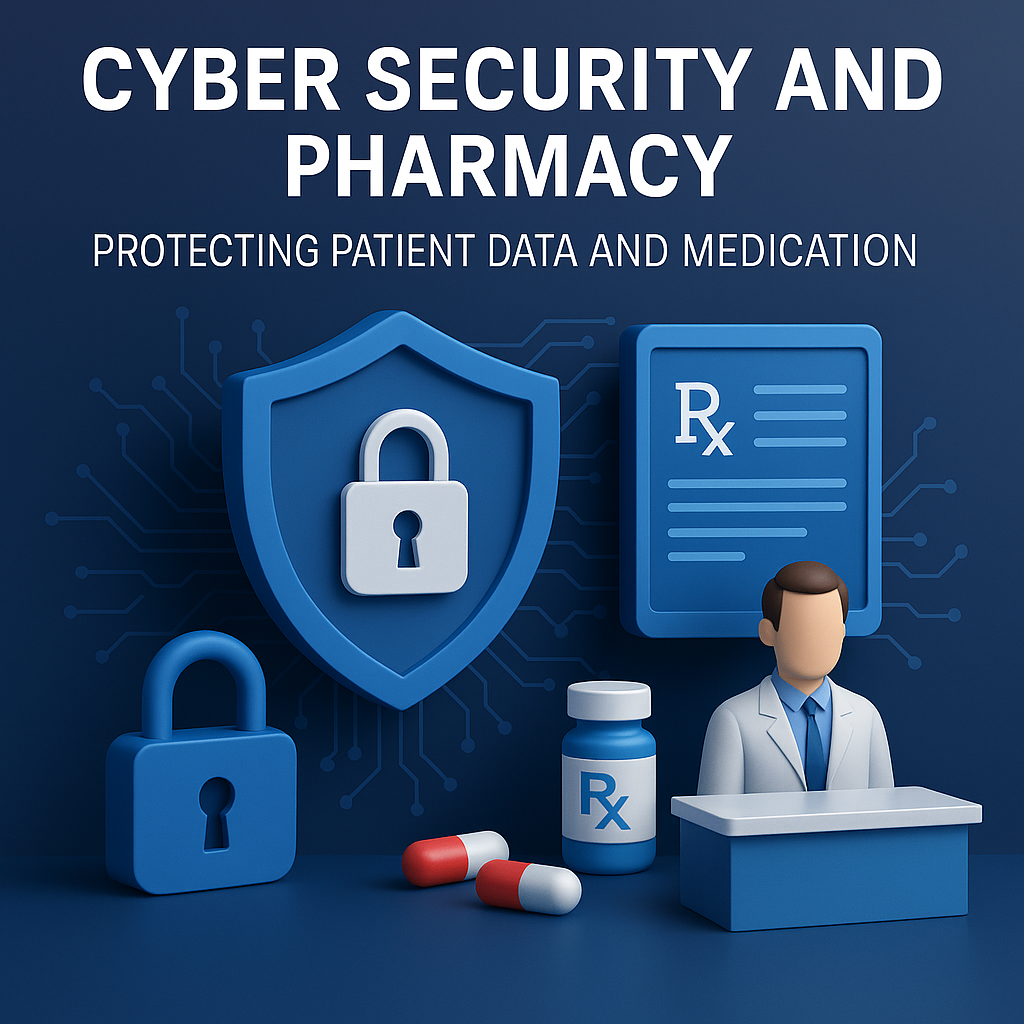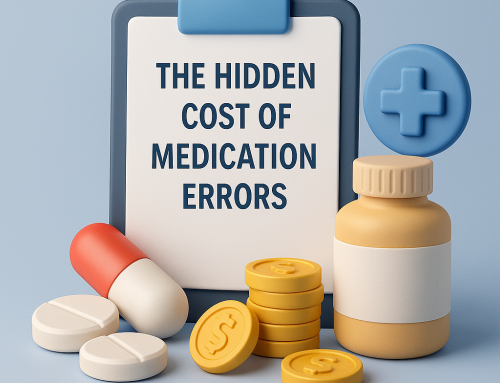Cybersecurity has become one of the greatest concerns in today’s interconnected healthcare landscape. Pharmacies handle some of the most sensitive information in healthcare, and their handling of personal health records and controlled substance inventories makes them prime targets for cyber criminals.
But while the future might seem frightening, solutions to combat cyber threats keep evolving to combat attacks. Cybersecurity is the answer, giving patients peace of mind without requiring building walls between patients and slowing down operations.
Why Cyber Security Is Critical for Modern Pharmacies
Healthcare data breaches have skyrocketed in recent years. Pharmacies represent a particularly attractive target for valuable information. Pharmacies maintain inventory databases, patient records, billing systems, and increasingly automated medication management platforms that require comprehensive protection.

- Protecting Patient Safety and Trust
Patient health information is among the most sensitive information in existence. A single breach could expose not only medical histories but also insurance details, addresses, and payment information. Cybersecurity measures that focus primarily on safety ensure patients’ trust remains intact while maintaining compliance with HIPAA and other regulatory requirements.
- Securing Controlled Substance Management
Pharmacies managing controlled substances have their own unique cybersecurity challenges. Digital inventory systems that track narcotics and other controlled medications require multilayered security approaches. Advanced biometric authentication and secure audit trails help prevent unauthorized access while maintaining the required detailed records.
- Maintaining Operational Continuity
Cyber attacks completely shut down operations. Ransomware attacks have forced pharmacies to close temporarily, disrupting patient care and creating dangerous gaps in medication access. Comprehensive cybersecurity strategies ensure that critical systems remain operational even when under attack.
- Integration Security Across Systems
Modern pharmacies often rely on interconnected systems like electronic health records (EHRs), medication administration records (eMARs), and automated dispensing units. Each connection point is its own potential vulnerability, making system-wide security coordination essential for protecting the entire medication management system.
The Evolution of Cyber Security in Pharmacy Management
As the cybersecurity landscape continues to change, new technologies and approaches are emerging to address both critical threats and future challenges.
- Advanced Authentication and Access Controls
Passwords can no longer provide absolute protection. Modern pharmacy security systems now incorporate multi-factor authentication, biometric scanners, and role-based access controls, ensuring only authorized personnel can access certain systems and information.
- Real-Time Monitoring and Threat Detection
Modern cybersecurity systems are on the hook for preventing attacks and monitoring suspicious activity. Advanced monitoring platforms can detect unusual access patterns, unauthorized login attempts, or unexpected system behaviors. They become the frontline when alerting security teams before minor incidents become major breaches.
- Encrypted Communications and Data Storage
Current industry standards require that all pharmacy data, whether at rest or in transit, be encrypted. This includes patient records, inventory databases, and communications between different systems or facilities. Modern medication management platforms incorporate end-to-end encryption to ensure that, even if data isn’t intercepted, it remains unreadable to unauthorized parties.
- Automated Security Updates and Patch Management
Updating systems to the latest security patches is challenging but crucial in busy pharmacy environments. When security updates are applied across all platforms, automated patch management systems take the brunt of the work without disrupting daily operations.
- Cloud-Based Security Solutions
Cloud platforms offer scalability and security solutions and are some of the most advanced in the field. They offer enterprise-level protection, including advanced threat detection, automated backups, and disaster recovery capabilities.
Practical Steps for Implementing Pharmacy Cyber Security
Comprehensive cybersecurity defenses require a systematic approach to balance protection and operational efficiency. The goal is to create security measures that enhance pharmacy operations. Below is a list of the best ways to prepare your pharmacy for cyber attacks.
- Conduct a Comprehensive Security Assessment
Always audit existing security systems and measures to identify any potential vulnerabilities. Your assessment should cover everything from network infrastructure to individual devices and user access points. Understanding your security environment helps you prioritize the most important changes early and allocate resources effectively.
- Implement Multi-Layered Authentication
Strong authentication is at the heart of pharmacy cybersecurity. Modern systems should incorporate biometric authentication for high-security areas, monitor multi-factor authentication for monitoring system access, and provide role-based permissions that limit user access to only the systems necessary for their responsibilities.
- Establish Secure Communication Protocols
All communications between pharmacy systems, healthcare networks, and external partners should be encrypted. Data transmissions for insurance companies, communications with physicians’ offices, and transfers between different pharmacy locations or automated systems should have the same level of security.
- Create Robust Data Backup and Recovery Plans
Comprehensive backup strategies are critical for access during security incidents. Modern backup solutions now include automated, encrypted backups stored in multiple locations, all with tested recovery procedures that can restore operations quickly.
- Train Staff on Security Best Practices
Technology shouldn’t be your only line of defense for cybersecurity protection. Staff training programs should cover password management, recognizing phishing attempts, proper handling of patient information, and incident reporting procedures. Because cybersecurity evolves quickly, regular training updates maintain security awareness.
- Monitor and Audit System Access
Continuous monitoring systems track who accesses what information and when. Audit trails are then created in response to both security and compliance requirements. These systems flag unusual access patterns and provide detailed reports for regulatory inspections or security investigations.
- Develop Incident Response Procedures
Despite best efforts, cybersecurity incidents sometimes still occur. Create clear incident response procedures to help minimize damage and restore operations quickly. These procedures should include communication protocols, contamination strategies, and recovery steps that protect both patient information and operational continuity.
- Regular Security Testing and Updates
Cybersecurity requires ongoing attention. Regular penetration testing, vulnerability assessments, and security audits help identify new threats and ensure that protective measures remain effective as systems and threats change.
The Future of Pharmacy Cybersecurity
Pharmacy operations continually become more digital and interconnected. So, more robust cybersecurity will evolve to meet those challenges. Artificial intelligence and machine learning are already enhancing threat detection and response capabilities.
Integrating Internet of Things (IoT) devices and pharmacy settings creates new security considerations for proactive planning and protective measures. Everything from smart refrigeration units to automated dispensing systems will become more secure as cyber security continues to evolve.
Why Pharmacy Cybersecurity Matters
If you manage a pharmacy or healthcare facility, you already understand the importance of patient safety and operational reliability. But think about this: What could happen to your facility’s reputation and patient trust if a single security breach compromised years of careful relationship building?
Cybersecurity ensures that your facility can continue providing exceptional patient care without interruptions. The investment in robust security measures pays dividends in operational continuity, regulatory compliance, and most importantly, patient trust.
At Phoenix Medical Management Solutions, we understand that cybersecurity must be built into medication management systems, which is why our advanced automated medication management platforms incorporate biometric authentication, encrypted communications, and comprehensive audit trails designed to protect patient information while streamlining pharmacy operations. Contact us today to discover how our security-focused solutions can enhance your facilities’ cybersecurity posture while improving medication management efficiency.







